Essay on Child Development: Psychosocial Skill Improvement (401005)
VerifiedAdded on 2022/11/16
|9
|2335
|497
Essay
AI Summary
This essay delves into the crucial aspects of psychosocial skill development in children aged 2-5 years, emphasizing the significance of this developmental phase. It examines the essential characteristics of psychosocial improvement, including the influence of environmental factors and the role of parents and caregivers. The essay references key theories, such as Piaget's and Erikson's stages of development, to explain the mechanisms of social and psychosocial growth. Through a case study analysis, the essay explores practical examples of how children develop autonomy, initiative, and social competency, while also addressing challenges such as toilet training. The importance of providing support and encouragement to children, and the role of daycare environments and interactions with peers are also discussed. The essay stresses the need for nurses and caregivers to understand normative and non-normative development, and to use critical thinking skills when assessing a child's development. The essay underscores the importance of family involvement and responsiveness to a child's needs to foster optimal psychosocial outcomes.
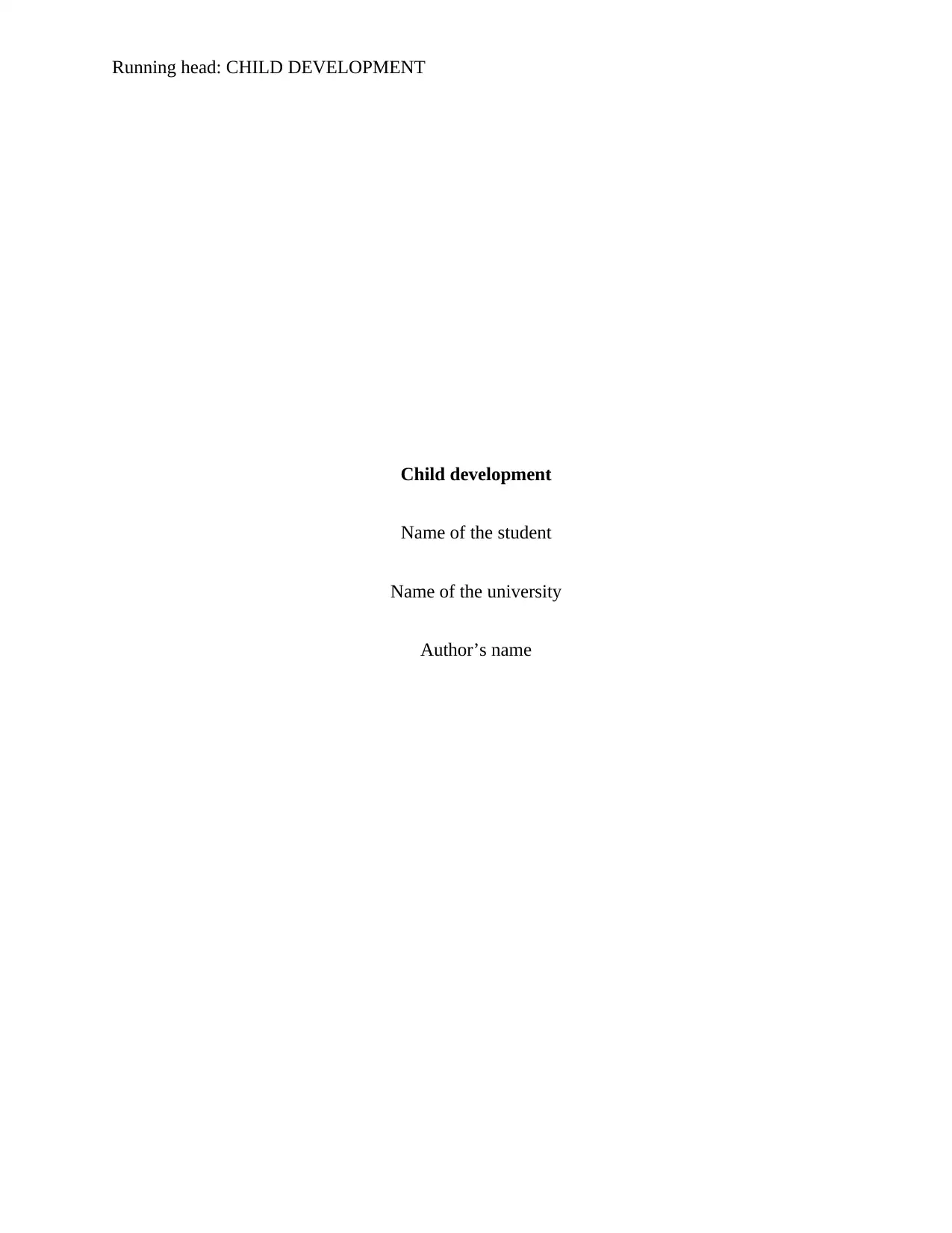
Running head: CHILD DEVELOPMENT
Child development
Name of the student
Name of the university
Author’s name
Child development
Name of the student
Name of the university
Author’s name
Paraphrase This Document
Need a fresh take? Get an instant paraphrase of this document with our AI Paraphraser
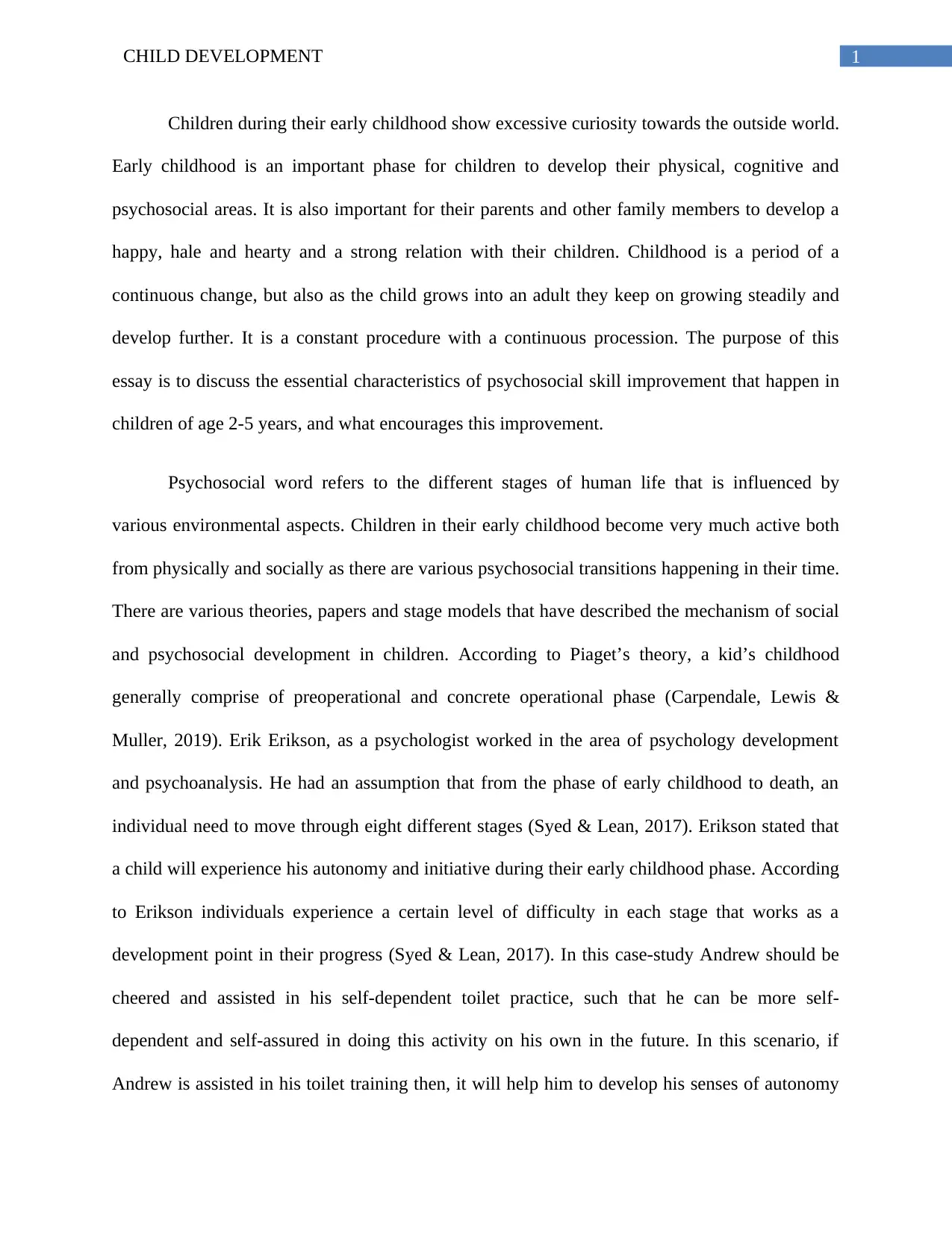
1CHILD DEVELOPMENT
Children during their early childhood show excessive curiosity towards the outside world.
Early childhood is an important phase for children to develop their physical, cognitive and
psychosocial areas. It is also important for their parents and other family members to develop a
happy, hale and hearty and a strong relation with their children. Childhood is a period of a
continuous change, but also as the child grows into an adult they keep on growing steadily and
develop further. It is a constant procedure with a continuous procession. The purpose of this
essay is to discuss the essential characteristics of psychosocial skill improvement that happen in
children of age 2-5 years, and what encourages this improvement.
Psychosocial word refers to the different stages of human life that is influenced by
various environmental aspects. Children in their early childhood become very much active both
from physically and socially as there are various psychosocial transitions happening in their time.
There are various theories, papers and stage models that have described the mechanism of social
and psychosocial development in children. According to Piaget’s theory, a kid’s childhood
generally comprise of preoperational and concrete operational phase (Carpendale, Lewis &
Muller, 2019). Erik Erikson, as a psychologist worked in the area of psychology development
and psychoanalysis. He had an assumption that from the phase of early childhood to death, an
individual need to move through eight different stages (Syed & Lean, 2017). Erikson stated that
a child will experience his autonomy and initiative during their early childhood phase. According
to Erikson individuals experience a certain level of difficulty in each stage that works as a
development point in their progress (Syed & Lean, 2017). In this case-study Andrew should be
cheered and assisted in his self-dependent toilet practice, such that he can be more self-
dependent and self-assured in doing this activity on his own in the future. In this scenario, if
Andrew is assisted in his toilet training then, it will help him to develop his senses of autonomy
Children during their early childhood show excessive curiosity towards the outside world.
Early childhood is an important phase for children to develop their physical, cognitive and
psychosocial areas. It is also important for their parents and other family members to develop a
happy, hale and hearty and a strong relation with their children. Childhood is a period of a
continuous change, but also as the child grows into an adult they keep on growing steadily and
develop further. It is a constant procedure with a continuous procession. The purpose of this
essay is to discuss the essential characteristics of psychosocial skill improvement that happen in
children of age 2-5 years, and what encourages this improvement.
Psychosocial word refers to the different stages of human life that is influenced by
various environmental aspects. Children in their early childhood become very much active both
from physically and socially as there are various psychosocial transitions happening in their time.
There are various theories, papers and stage models that have described the mechanism of social
and psychosocial development in children. According to Piaget’s theory, a kid’s childhood
generally comprise of preoperational and concrete operational phase (Carpendale, Lewis &
Muller, 2019). Erik Erikson, as a psychologist worked in the area of psychology development
and psychoanalysis. He had an assumption that from the phase of early childhood to death, an
individual need to move through eight different stages (Syed & Lean, 2017). Erikson stated that
a child will experience his autonomy and initiative during their early childhood phase. According
to Erikson individuals experience a certain level of difficulty in each stage that works as a
development point in their progress (Syed & Lean, 2017). In this case-study Andrew should be
cheered and assisted in his self-dependent toilet practice, such that he can be more self-
dependent and self-assured in doing this activity on his own in the future. In this scenario, if
Andrew is assisted in his toilet training then, it will help him to develop his senses of autonomy
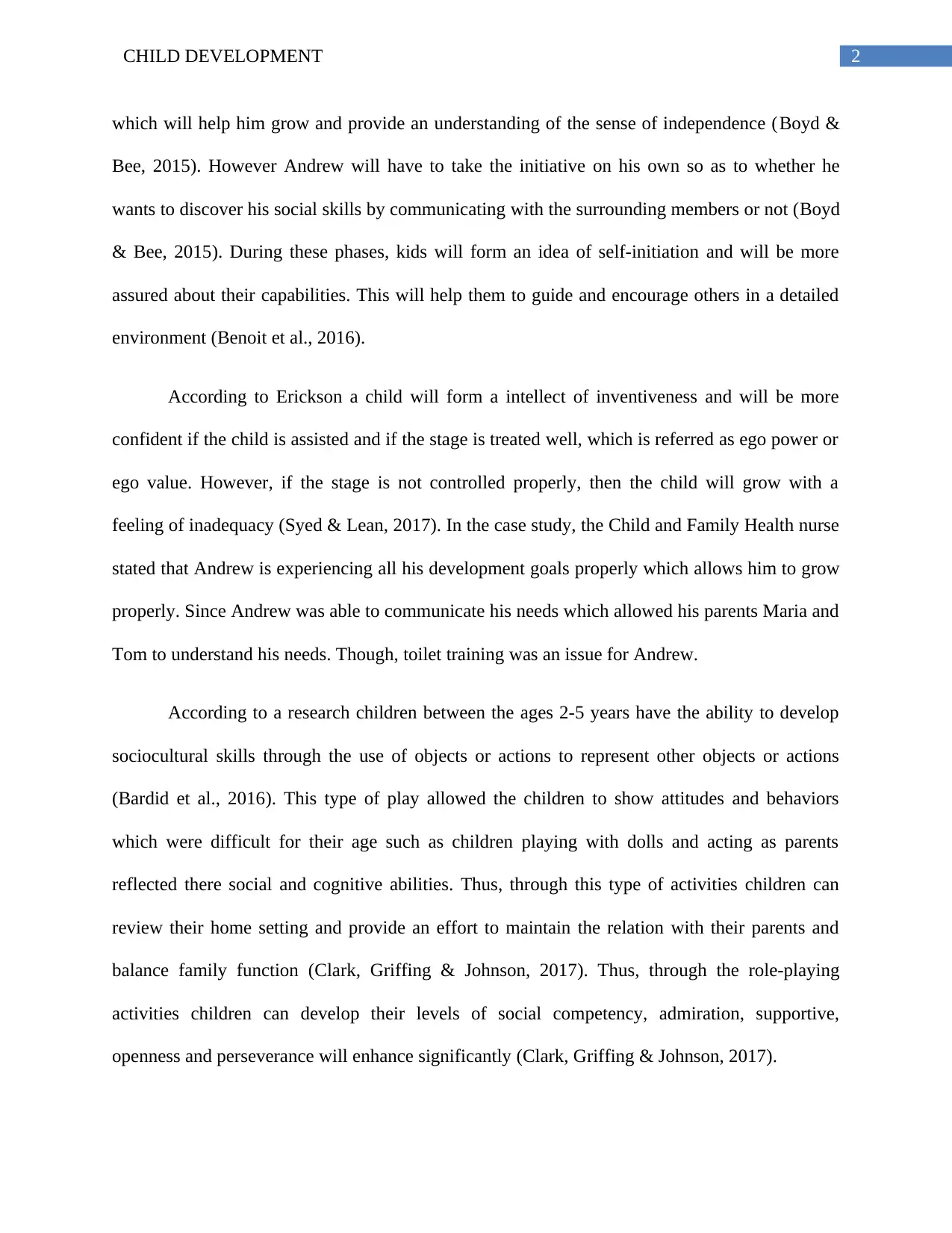
2CHILD DEVELOPMENT
which will help him grow and provide an understanding of the sense of independence (Boyd &
Bee, 2015). However Andrew will have to take the initiative on his own so as to whether he
wants to discover his social skills by communicating with the surrounding members or not (Boyd
& Bee, 2015). During these phases, kids will form an idea of self-initiation and will be more
assured about their capabilities. This will help them to guide and encourage others in a detailed
environment (Benoit et al., 2016).
According to Erickson a child will form a intellect of inventiveness and will be more
confident if the child is assisted and if the stage is treated well, which is referred as ego power or
ego value. However, if the stage is not controlled properly, then the child will grow with a
feeling of inadequacy (Syed & Lean, 2017). In the case study, the Child and Family Health nurse
stated that Andrew is experiencing all his development goals properly which allows him to grow
properly. Since Andrew was able to communicate his needs which allowed his parents Maria and
Tom to understand his needs. Though, toilet training was an issue for Andrew.
According to a research children between the ages 2-5 years have the ability to develop
sociocultural skills through the use of objects or actions to represent other objects or actions
(Bardid et al., 2016). This type of play allowed the children to show attitudes and behaviors
which were difficult for their age such as children playing with dolls and acting as parents
reflected there social and cognitive abilities. Thus, through this type of activities children can
review their home setting and provide an effort to maintain the relation with their parents and
balance family function (Clark, Griffing & Johnson, 2017). Thus, through the role-playing
activities children can develop their levels of social competency, admiration, supportive,
openness and perseverance will enhance significantly (Clark, Griffing & Johnson, 2017).
which will help him grow and provide an understanding of the sense of independence (Boyd &
Bee, 2015). However Andrew will have to take the initiative on his own so as to whether he
wants to discover his social skills by communicating with the surrounding members or not (Boyd
& Bee, 2015). During these phases, kids will form an idea of self-initiation and will be more
assured about their capabilities. This will help them to guide and encourage others in a detailed
environment (Benoit et al., 2016).
According to Erickson a child will form a intellect of inventiveness and will be more
confident if the child is assisted and if the stage is treated well, which is referred as ego power or
ego value. However, if the stage is not controlled properly, then the child will grow with a
feeling of inadequacy (Syed & Lean, 2017). In the case study, the Child and Family Health nurse
stated that Andrew is experiencing all his development goals properly which allows him to grow
properly. Since Andrew was able to communicate his needs which allowed his parents Maria and
Tom to understand his needs. Though, toilet training was an issue for Andrew.
According to a research children between the ages 2-5 years have the ability to develop
sociocultural skills through the use of objects or actions to represent other objects or actions
(Bardid et al., 2016). This type of play allowed the children to show attitudes and behaviors
which were difficult for their age such as children playing with dolls and acting as parents
reflected there social and cognitive abilities. Thus, through this type of activities children can
review their home setting and provide an effort to maintain the relation with their parents and
balance family function (Clark, Griffing & Johnson, 2017). Thus, through the role-playing
activities children can develop their levels of social competency, admiration, supportive,
openness and perseverance will enhance significantly (Clark, Griffing & Johnson, 2017).
⊘ This is a preview!⊘
Do you want full access?
Subscribe today to unlock all pages.

Trusted by 1+ million students worldwide
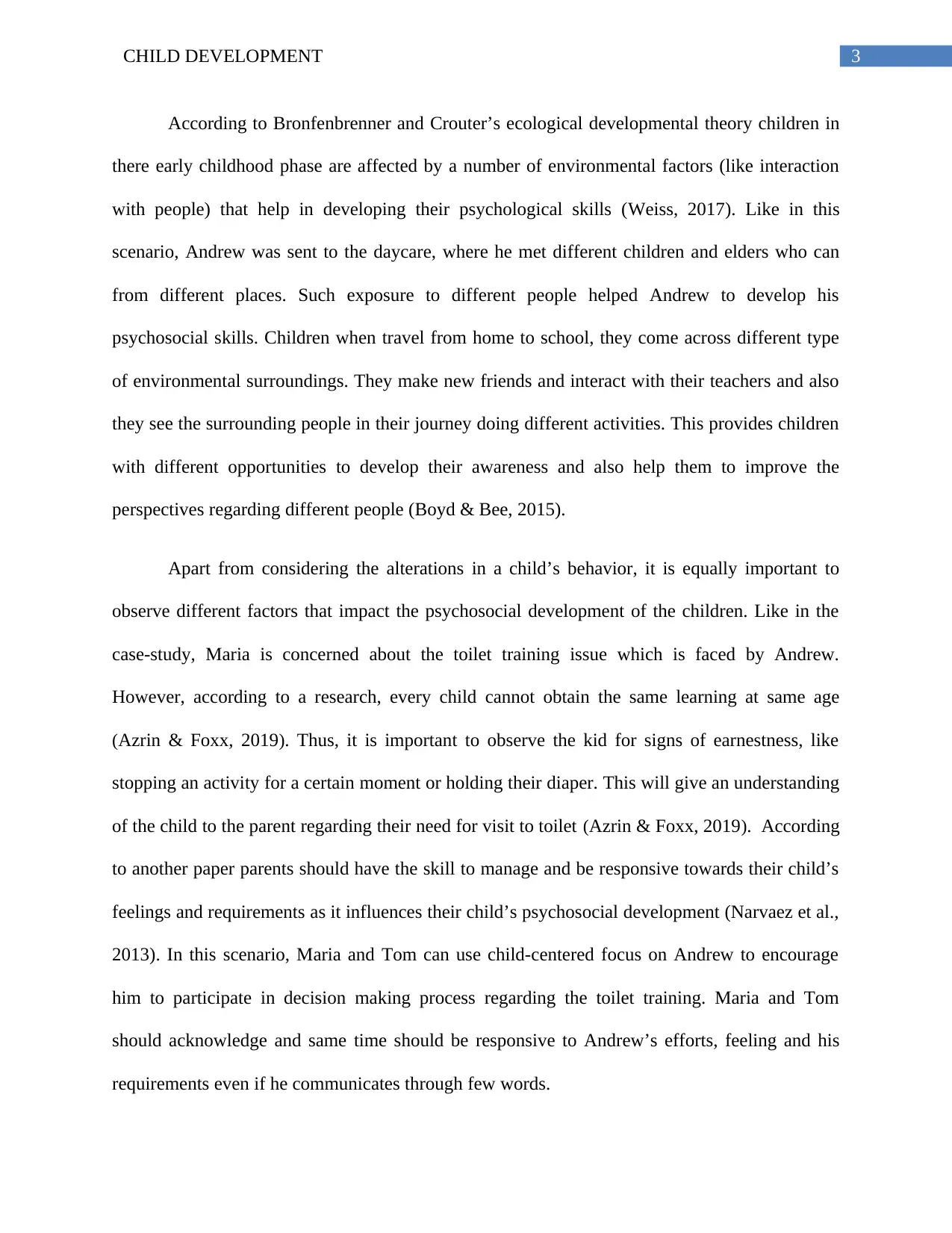
3CHILD DEVELOPMENT
According to Bronfenbrenner and Crouter’s ecological developmental theory children in
there early childhood phase are affected by a number of environmental factors (like interaction
with people) that help in developing their psychological skills (Weiss, 2017). Like in this
scenario, Andrew was sent to the daycare, where he met different children and elders who can
from different places. Such exposure to different people helped Andrew to develop his
psychosocial skills. Children when travel from home to school, they come across different type
of environmental surroundings. They make new friends and interact with their teachers and also
they see the surrounding people in their journey doing different activities. This provides children
with different opportunities to develop their awareness and also help them to improve the
perspectives regarding different people (Boyd & Bee, 2015).
Apart from considering the alterations in a child’s behavior, it is equally important to
observe different factors that impact the psychosocial development of the children. Like in the
case-study, Maria is concerned about the toilet training issue which is faced by Andrew.
However, according to a research, every child cannot obtain the same learning at same age
(Azrin & Foxx, 2019). Thus, it is important to observe the kid for signs of earnestness, like
stopping an activity for a certain moment or holding their diaper. This will give an understanding
of the child to the parent regarding their need for visit to toilet (Azrin & Foxx, 2019). According
to another paper parents should have the skill to manage and be responsive towards their child’s
feelings and requirements as it influences their child’s psychosocial development (Narvaez et al.,
2013). In this scenario, Maria and Tom can use child-centered focus on Andrew to encourage
him to participate in decision making process regarding the toilet training. Maria and Tom
should acknowledge and same time should be responsive to Andrew’s efforts, feeling and his
requirements even if he communicates through few words.
According to Bronfenbrenner and Crouter’s ecological developmental theory children in
there early childhood phase are affected by a number of environmental factors (like interaction
with people) that help in developing their psychological skills (Weiss, 2017). Like in this
scenario, Andrew was sent to the daycare, where he met different children and elders who can
from different places. Such exposure to different people helped Andrew to develop his
psychosocial skills. Children when travel from home to school, they come across different type
of environmental surroundings. They make new friends and interact with their teachers and also
they see the surrounding people in their journey doing different activities. This provides children
with different opportunities to develop their awareness and also help them to improve the
perspectives regarding different people (Boyd & Bee, 2015).
Apart from considering the alterations in a child’s behavior, it is equally important to
observe different factors that impact the psychosocial development of the children. Like in the
case-study, Maria is concerned about the toilet training issue which is faced by Andrew.
However, according to a research, every child cannot obtain the same learning at same age
(Azrin & Foxx, 2019). Thus, it is important to observe the kid for signs of earnestness, like
stopping an activity for a certain moment or holding their diaper. This will give an understanding
of the child to the parent regarding their need for visit to toilet (Azrin & Foxx, 2019). According
to another paper parents should have the skill to manage and be responsive towards their child’s
feelings and requirements as it influences their child’s psychosocial development (Narvaez et al.,
2013). In this scenario, Maria and Tom can use child-centered focus on Andrew to encourage
him to participate in decision making process regarding the toilet training. Maria and Tom
should acknowledge and same time should be responsive to Andrew’s efforts, feeling and his
requirements even if he communicates through few words.
Paraphrase This Document
Need a fresh take? Get an instant paraphrase of this document with our AI Paraphraser
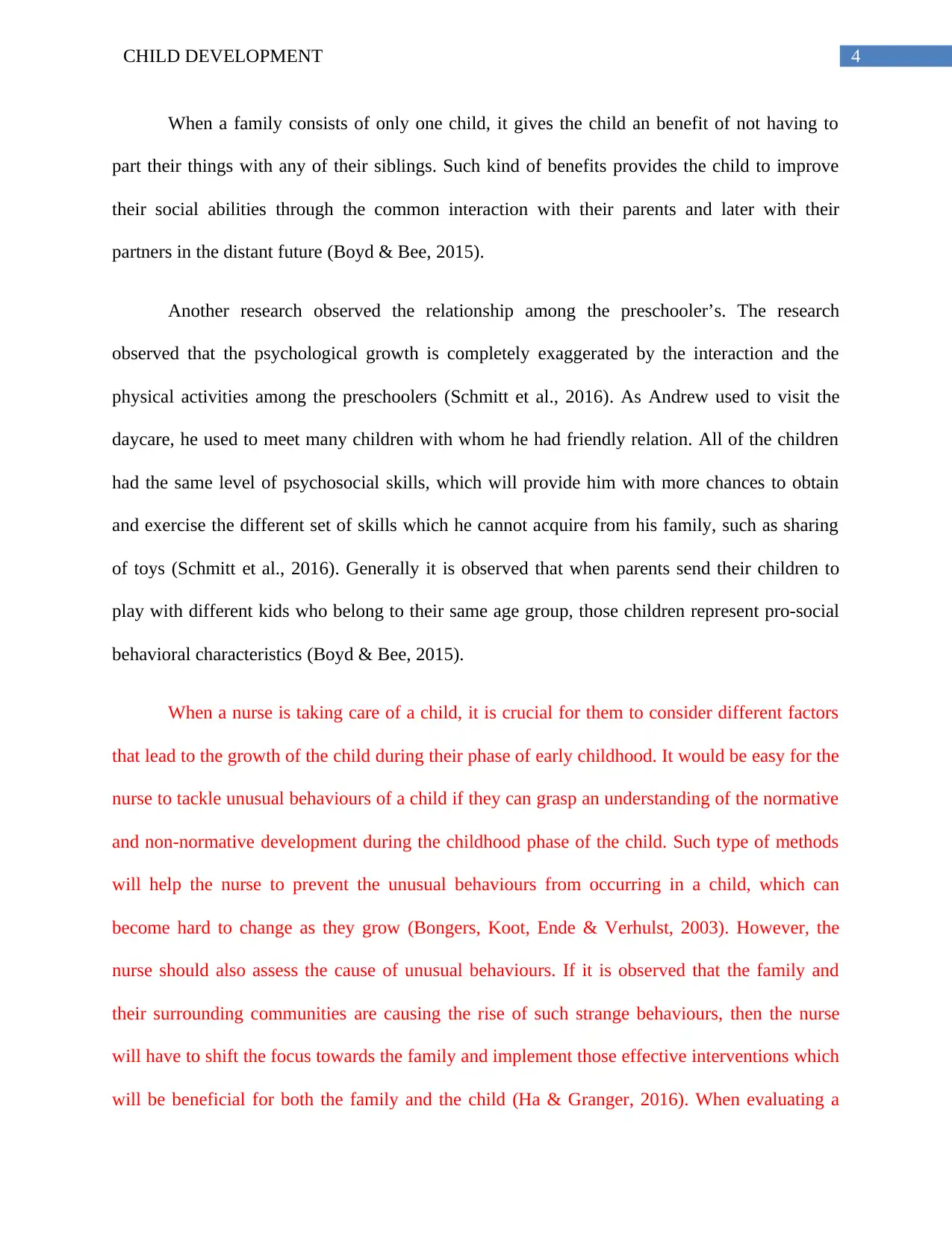
4CHILD DEVELOPMENT
When a family consists of only one child, it gives the child an benefit of not having to
part their things with any of their siblings. Such kind of benefits provides the child to improve
their social abilities through the common interaction with their parents and later with their
partners in the distant future (Boyd & Bee, 2015).
Another research observed the relationship among the preschooler’s. The research
observed that the psychological growth is completely exaggerated by the interaction and the
physical activities among the preschoolers (Schmitt et al., 2016). As Andrew used to visit the
daycare, he used to meet many children with whom he had friendly relation. All of the children
had the same level of psychosocial skills, which will provide him with more chances to obtain
and exercise the different set of skills which he cannot acquire from his family, such as sharing
of toys (Schmitt et al., 2016). Generally it is observed that when parents send their children to
play with different kids who belong to their same age group, those children represent pro-social
behavioral characteristics (Boyd & Bee, 2015).
When a nurse is taking care of a child, it is crucial for them to consider different factors
that lead to the growth of the child during their phase of early childhood. It would be easy for the
nurse to tackle unusual behaviours of a child if they can grasp an understanding of the normative
and non-normative development during the childhood phase of the child. Such type of methods
will help the nurse to prevent the unusual behaviours from occurring in a child, which can
become hard to change as they grow (Bongers, Koot, Ende & Verhulst, 2003). However, the
nurse should also assess the cause of unusual behaviours. If it is observed that the family and
their surrounding communities are causing the rise of such strange behaviours, then the nurse
will have to shift the focus towards the family and implement those effective interventions which
will be beneficial for both the family and the child (Ha & Granger, 2016). When evaluating a
When a family consists of only one child, it gives the child an benefit of not having to
part their things with any of their siblings. Such kind of benefits provides the child to improve
their social abilities through the common interaction with their parents and later with their
partners in the distant future (Boyd & Bee, 2015).
Another research observed the relationship among the preschooler’s. The research
observed that the psychological growth is completely exaggerated by the interaction and the
physical activities among the preschoolers (Schmitt et al., 2016). As Andrew used to visit the
daycare, he used to meet many children with whom he had friendly relation. All of the children
had the same level of psychosocial skills, which will provide him with more chances to obtain
and exercise the different set of skills which he cannot acquire from his family, such as sharing
of toys (Schmitt et al., 2016). Generally it is observed that when parents send their children to
play with different kids who belong to their same age group, those children represent pro-social
behavioral characteristics (Boyd & Bee, 2015).
When a nurse is taking care of a child, it is crucial for them to consider different factors
that lead to the growth of the child during their phase of early childhood. It would be easy for the
nurse to tackle unusual behaviours of a child if they can grasp an understanding of the normative
and non-normative development during the childhood phase of the child. Such type of methods
will help the nurse to prevent the unusual behaviours from occurring in a child, which can
become hard to change as they grow (Bongers, Koot, Ende & Verhulst, 2003). However, the
nurse should also assess the cause of unusual behaviours. If it is observed that the family and
their surrounding communities are causing the rise of such strange behaviours, then the nurse
will have to shift the focus towards the family and implement those effective interventions which
will be beneficial for both the family and the child (Ha & Granger, 2016). When evaluating a
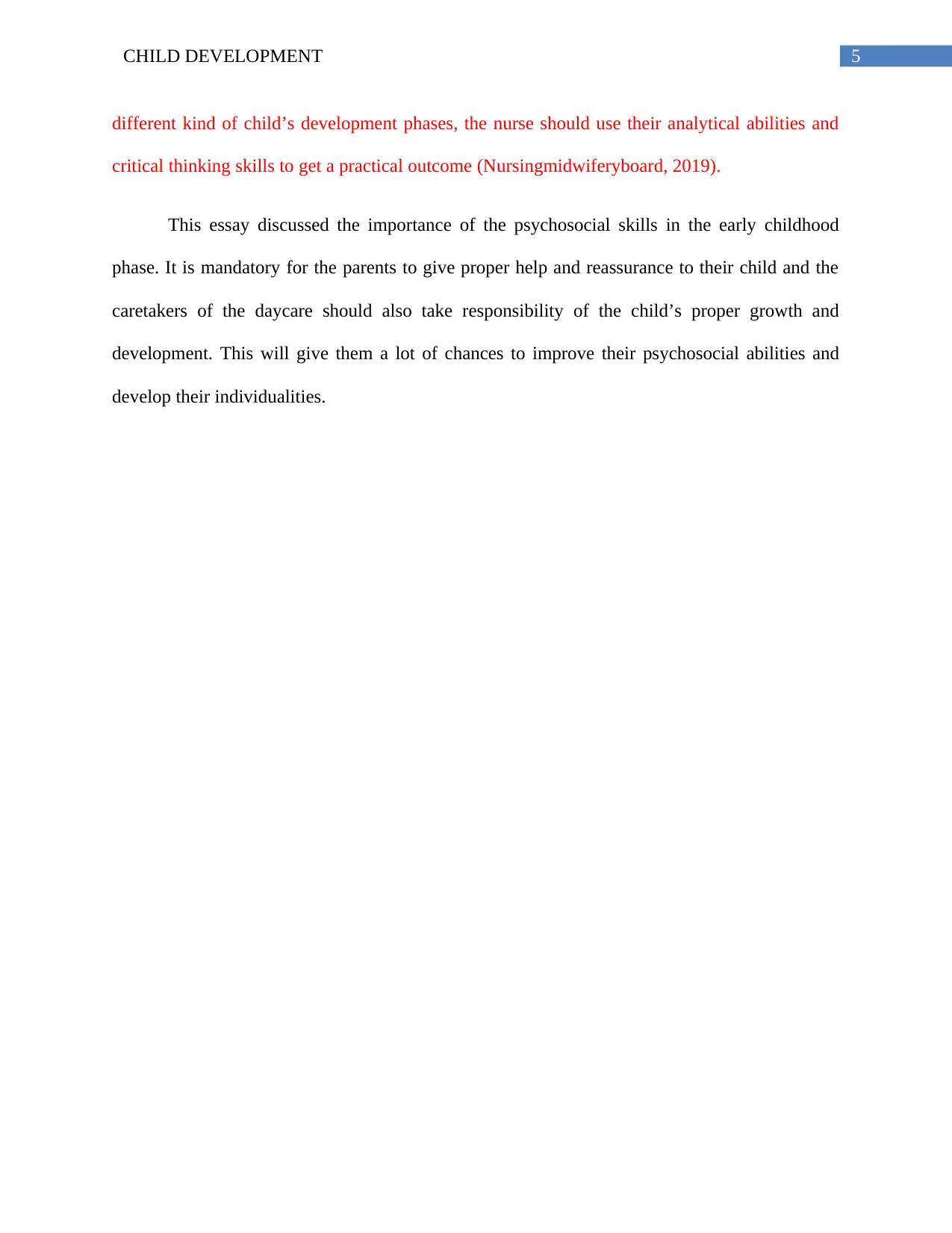
5CHILD DEVELOPMENT
different kind of child’s development phases, the nurse should use their analytical abilities and
critical thinking skills to get a practical outcome (Nursingmidwiferyboard, 2019).
This essay discussed the importance of the psychosocial skills in the early childhood
phase. It is mandatory for the parents to give proper help and reassurance to their child and the
caretakers of the daycare should also take responsibility of the child’s proper growth and
development. This will give them a lot of chances to improve their psychosocial abilities and
develop their individualities.
different kind of child’s development phases, the nurse should use their analytical abilities and
critical thinking skills to get a practical outcome (Nursingmidwiferyboard, 2019).
This essay discussed the importance of the psychosocial skills in the early childhood
phase. It is mandatory for the parents to give proper help and reassurance to their child and the
caretakers of the daycare should also take responsibility of the child’s proper growth and
development. This will give them a lot of chances to improve their psychosocial abilities and
develop their individualities.
⊘ This is a preview!⊘
Do you want full access?
Subscribe today to unlock all pages.

Trusted by 1+ million students worldwide
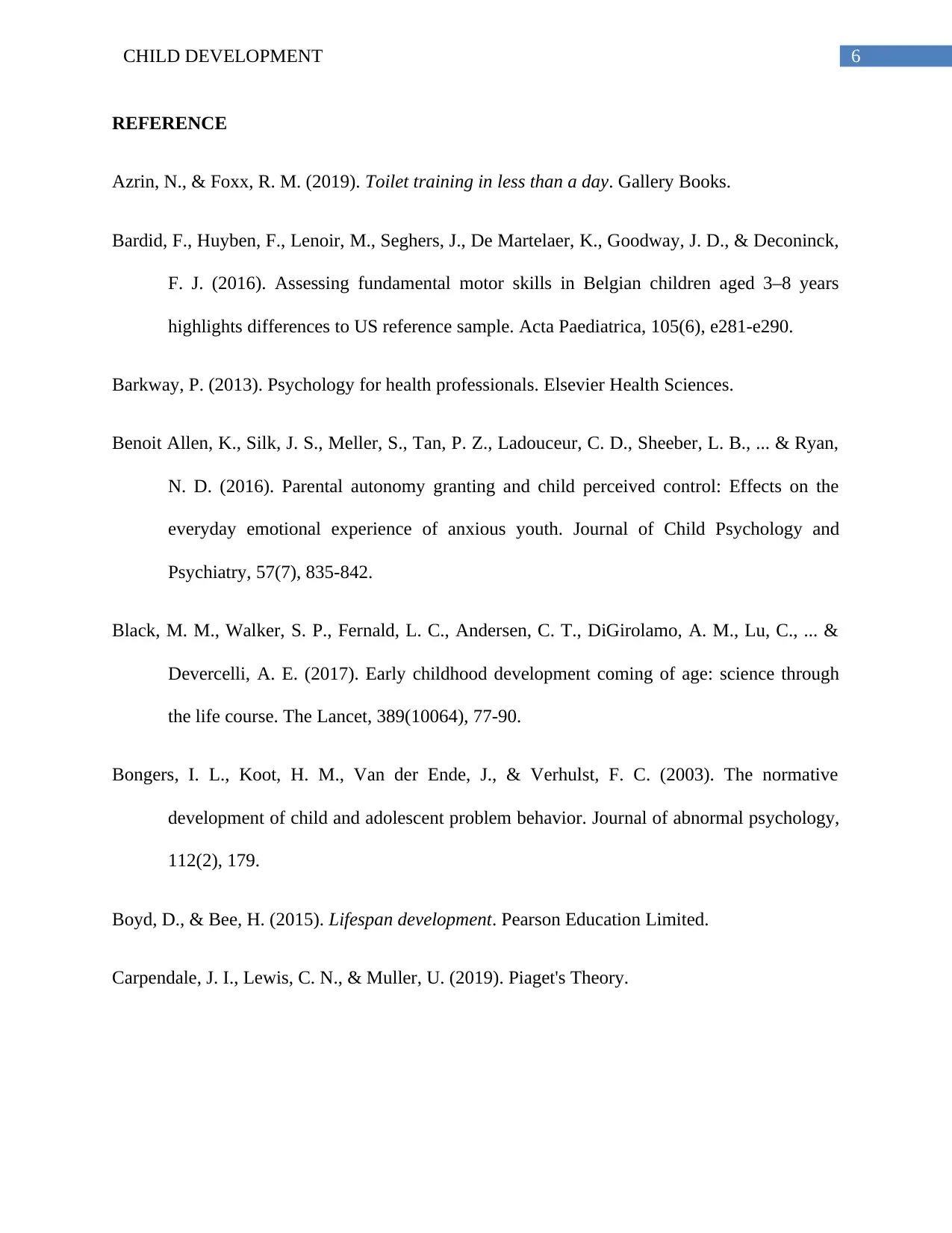
6CHILD DEVELOPMENT
REFERENCE
Azrin, N., & Foxx, R. M. (2019). Toilet training in less than a day. Gallery Books.
Bardid, F., Huyben, F., Lenoir, M., Seghers, J., De Martelaer, K., Goodway, J. D., & Deconinck,
F. J. (2016). Assessing fundamental motor skills in Belgian children aged 3–8 years
highlights differences to US reference sample. Acta Paediatrica, 105(6), e281-e290.
Barkway, P. (2013). Psychology for health professionals. Elsevier Health Sciences.
Benoit Allen, K., Silk, J. S., Meller, S., Tan, P. Z., Ladouceur, C. D., Sheeber, L. B., ... & Ryan,
N. D. (2016). Parental autonomy granting and child perceived control: Effects on the
everyday emotional experience of anxious youth. Journal of Child Psychology and
Psychiatry, 57(7), 835-842.
Black, M. M., Walker, S. P., Fernald, L. C., Andersen, C. T., DiGirolamo, A. M., Lu, C., ... &
Devercelli, A. E. (2017). Early childhood development coming of age: science through
the life course. The Lancet, 389(10064), 77-90.
Bongers, I. L., Koot, H. M., Van der Ende, J., & Verhulst, F. C. (2003). The normative
development of child and adolescent problem behavior. Journal of abnormal psychology,
112(2), 179.
Boyd, D., & Bee, H. (2015). Lifespan development. Pearson Education Limited.
Carpendale, J. I., Lewis, C. N., & Muller, U. (2019). Piaget's Theory.
REFERENCE
Azrin, N., & Foxx, R. M. (2019). Toilet training in less than a day. Gallery Books.
Bardid, F., Huyben, F., Lenoir, M., Seghers, J., De Martelaer, K., Goodway, J. D., & Deconinck,
F. J. (2016). Assessing fundamental motor skills in Belgian children aged 3–8 years
highlights differences to US reference sample. Acta Paediatrica, 105(6), e281-e290.
Barkway, P. (2013). Psychology for health professionals. Elsevier Health Sciences.
Benoit Allen, K., Silk, J. S., Meller, S., Tan, P. Z., Ladouceur, C. D., Sheeber, L. B., ... & Ryan,
N. D. (2016). Parental autonomy granting and child perceived control: Effects on the
everyday emotional experience of anxious youth. Journal of Child Psychology and
Psychiatry, 57(7), 835-842.
Black, M. M., Walker, S. P., Fernald, L. C., Andersen, C. T., DiGirolamo, A. M., Lu, C., ... &
Devercelli, A. E. (2017). Early childhood development coming of age: science through
the life course. The Lancet, 389(10064), 77-90.
Bongers, I. L., Koot, H. M., Van der Ende, J., & Verhulst, F. C. (2003). The normative
development of child and adolescent problem behavior. Journal of abnormal psychology,
112(2), 179.
Boyd, D., & Bee, H. (2015). Lifespan development. Pearson Education Limited.
Carpendale, J. I., Lewis, C. N., & Muller, U. (2019). Piaget's Theory.
Paraphrase This Document
Need a fresh take? Get an instant paraphrase of this document with our AI Paraphraser
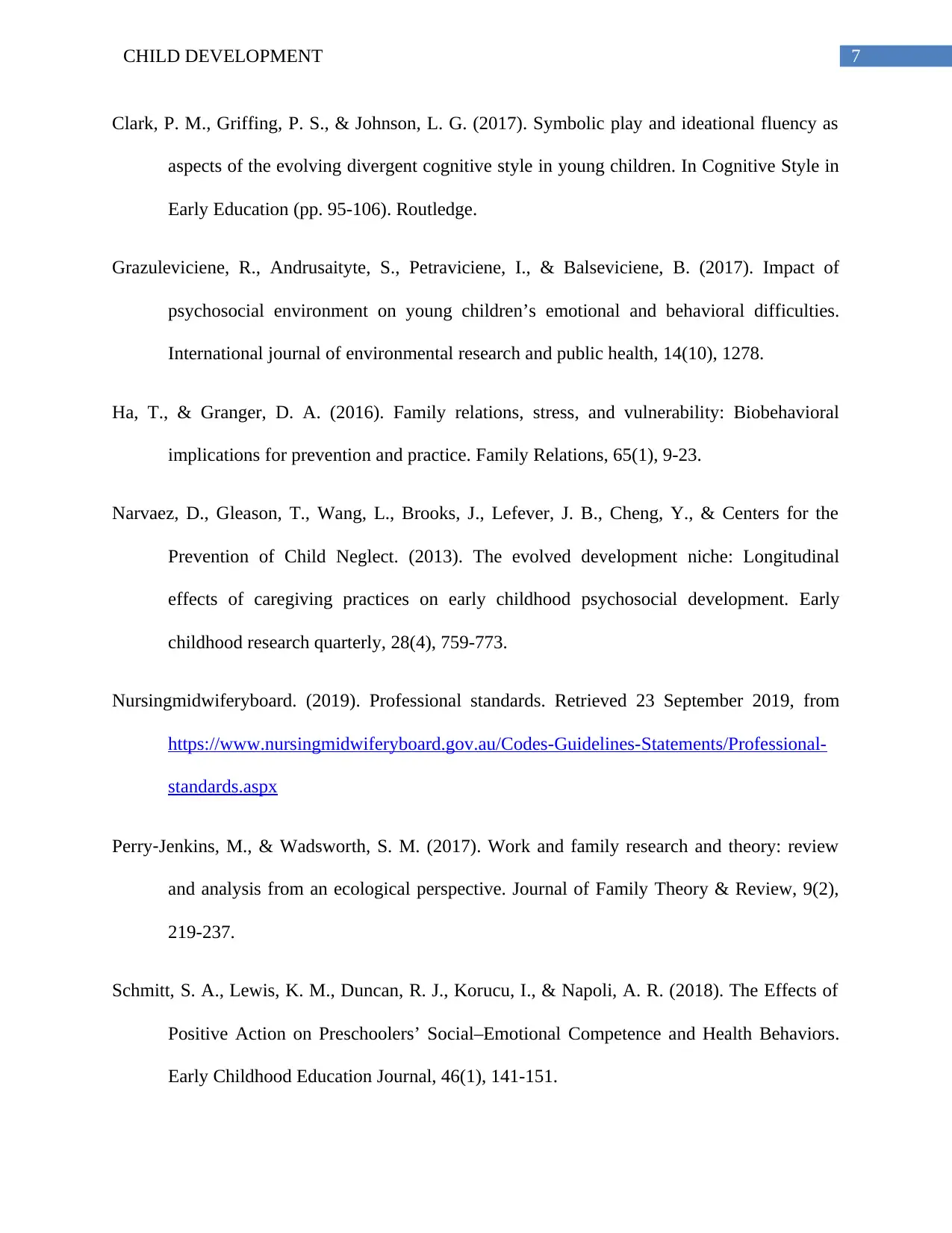
7CHILD DEVELOPMENT
Clark, P. M., Griffing, P. S., & Johnson, L. G. (2017). Symbolic play and ideational fluency as
aspects of the evolving divergent cognitive style in young children. In Cognitive Style in
Early Education (pp. 95-106). Routledge.
Grazuleviciene, R., Andrusaityte, S., Petraviciene, I., & Balseviciene, B. (2017). Impact of
psychosocial environment on young children’s emotional and behavioral difficulties.
International journal of environmental research and public health, 14(10), 1278.
Ha, T., & Granger, D. A. (2016). Family relations, stress, and vulnerability: Biobehavioral
implications for prevention and practice. Family Relations, 65(1), 9-23.
Narvaez, D., Gleason, T., Wang, L., Brooks, J., Lefever, J. B., Cheng, Y., & Centers for the
Prevention of Child Neglect. (2013). The evolved development niche: Longitudinal
effects of caregiving practices on early childhood psychosocial development. Early
childhood research quarterly, 28(4), 759-773.
Nursingmidwiferyboard. (2019). Professional standards. Retrieved 23 September 2019, from
https://www.nursingmidwiferyboard.gov.au/Codes-Guidelines-Statements/Professional-
standards.aspx
Perry‐Jenkins, M., & Wadsworth, S. M. (2017). Work and family research and theory: review
and analysis from an ecological perspective. Journal of Family Theory & Review, 9(2),
219-237.
Schmitt, S. A., Lewis, K. M., Duncan, R. J., Korucu, I., & Napoli, A. R. (2018). The Effects of
Positive Action on Preschoolers’ Social–Emotional Competence and Health Behaviors.
Early Childhood Education Journal, 46(1), 141-151.
Clark, P. M., Griffing, P. S., & Johnson, L. G. (2017). Symbolic play and ideational fluency as
aspects of the evolving divergent cognitive style in young children. In Cognitive Style in
Early Education (pp. 95-106). Routledge.
Grazuleviciene, R., Andrusaityte, S., Petraviciene, I., & Balseviciene, B. (2017). Impact of
psychosocial environment on young children’s emotional and behavioral difficulties.
International journal of environmental research and public health, 14(10), 1278.
Ha, T., & Granger, D. A. (2016). Family relations, stress, and vulnerability: Biobehavioral
implications for prevention and practice. Family Relations, 65(1), 9-23.
Narvaez, D., Gleason, T., Wang, L., Brooks, J., Lefever, J. B., Cheng, Y., & Centers for the
Prevention of Child Neglect. (2013). The evolved development niche: Longitudinal
effects of caregiving practices on early childhood psychosocial development. Early
childhood research quarterly, 28(4), 759-773.
Nursingmidwiferyboard. (2019). Professional standards. Retrieved 23 September 2019, from
https://www.nursingmidwiferyboard.gov.au/Codes-Guidelines-Statements/Professional-
standards.aspx
Perry‐Jenkins, M., & Wadsworth, S. M. (2017). Work and family research and theory: review
and analysis from an ecological perspective. Journal of Family Theory & Review, 9(2),
219-237.
Schmitt, S. A., Lewis, K. M., Duncan, R. J., Korucu, I., & Napoli, A. R. (2018). The Effects of
Positive Action on Preschoolers’ Social–Emotional Competence and Health Behaviors.
Early Childhood Education Journal, 46(1), 141-151.
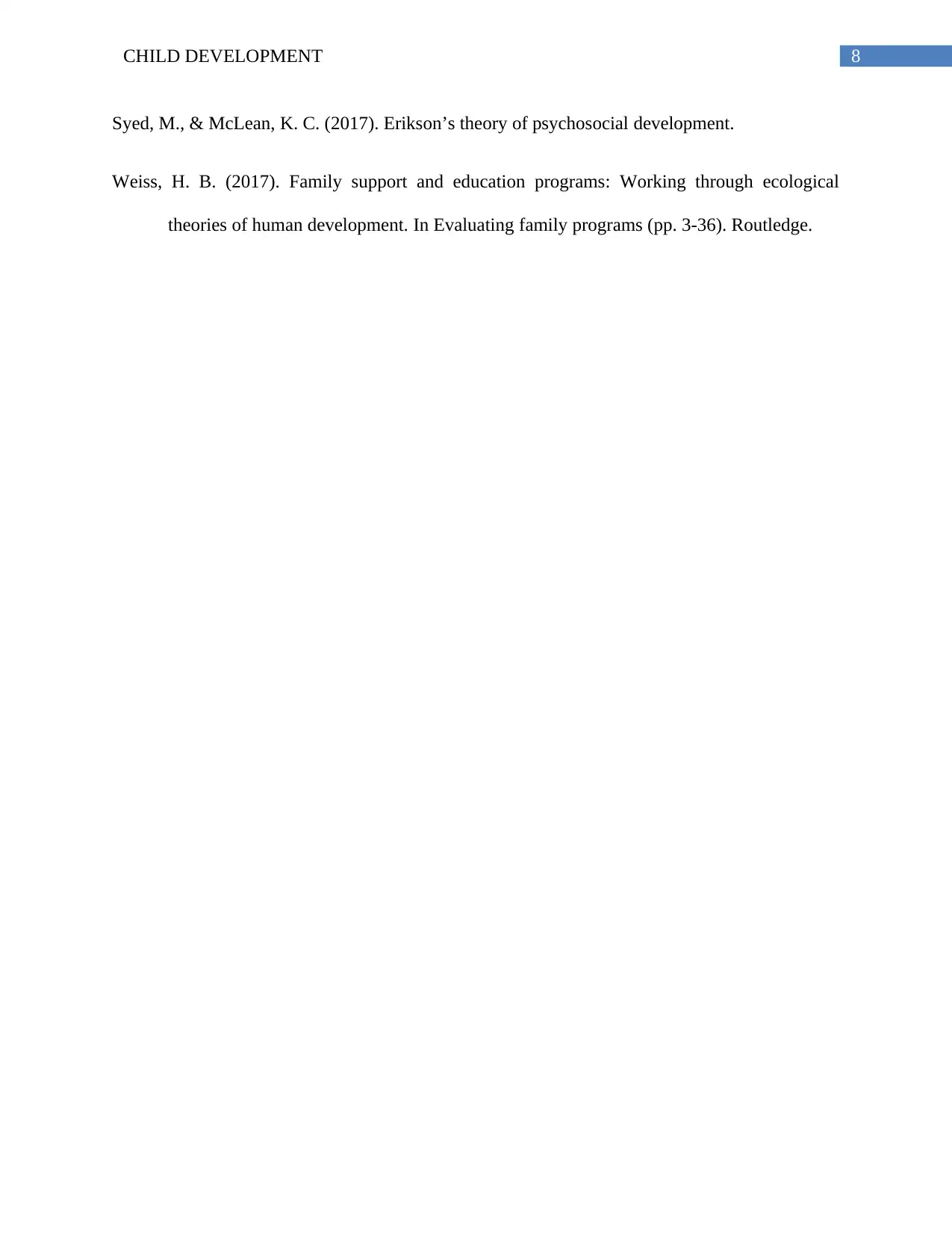
8CHILD DEVELOPMENT
Syed, M., & McLean, K. C. (2017). Erikson’s theory of psychosocial development.
Weiss, H. B. (2017). Family support and education programs: Working through ecological
theories of human development. In Evaluating family programs (pp. 3-36). Routledge.
Syed, M., & McLean, K. C. (2017). Erikson’s theory of psychosocial development.
Weiss, H. B. (2017). Family support and education programs: Working through ecological
theories of human development. In Evaluating family programs (pp. 3-36). Routledge.
⊘ This is a preview!⊘
Do you want full access?
Subscribe today to unlock all pages.

Trusted by 1+ million students worldwide
1 out of 9
Related Documents
Your All-in-One AI-Powered Toolkit for Academic Success.
+13062052269
info@desklib.com
Available 24*7 on WhatsApp / Email
![[object Object]](/_next/static/media/star-bottom.7253800d.svg)
Unlock your academic potential
Copyright © 2020–2026 A2Z Services. All Rights Reserved. Developed and managed by ZUCOL.





